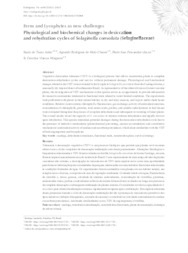Ferns and Lycophytes as new challenges: physiological and biochemical changes in desiccation and rehydration cycles of Selaginella convoluta (Selaginellaceae).
Ferns and Lycophytes as new challenges: physiological and biochemical changes in desiccation and rehydration cycles of Selaginella convoluta (Selaginellaceae).
Author(s): AIDAR, S. de T.; CHAVES, A. R. de M.; FERNANDES JUNIOR, P. I.; MORGANTE, C. V.
Summary: Vegetative desiccation tolerance (VDT) is a biological process that allows resurrection plants to complete desiccation-rehydration cycles and survive without permanent damage. Physiological and biochemical changes related to the VDT were evaluated in the lycophyte Selaginella convoluta from the Caatinga biome, a seasonally dry tropical forest of northeastern Brazil. As representative of the oldest division of extant vascular plants, the investigation of VDT mechanisms in this species serves as an opportunity to provide information for research communities interested in functional traits related to water-limited conditions. The experiments were performed with plants in their natural habitat, in dry and rainy seasons, and in pots under shade house conditions. Relative water content, chlorophyll a fluorescence, gas exchange, activity of antioxidant enzymes, concentration of chlorophylls, proteins, total amino acids, proline, and soluble carbohydrates in leaf tissues were evaluated throughout the process of complete dehydration and subsequent re-watering of intact plants. The overall results reveal the capacity of S. convoluta to tolerate extreme dehydration and rapidly recover upon rehydration. This species minimizes potential damages during the desiccation-rehydration cycle due to the presence of inductive mechanisms (photochemical preventing, sucrose accumulation) and constitutive mechanisms (antioxidant activity of catalase and ascorbate peroxidase), which share similarities with the VDT of both angiosperms and bryophytes.
Publication year: 2023
Types of publication: Journal article
Unit: Embrapa Semi-arid Region
Observation
Some of Embrapa's publications are published as ePub files. To read them, use or download one of the following free software options to your computer or mobile device. Android: Google Play Books; IOS: iBooks; Windows and Linux: Calibre.
Access other publications
Access the Agricultural Research Database (BDPA) to consult Embrapa's full library collection and records.
Visit Embrapa Bookstore to purchase books and other publications sold by Embrapa.

